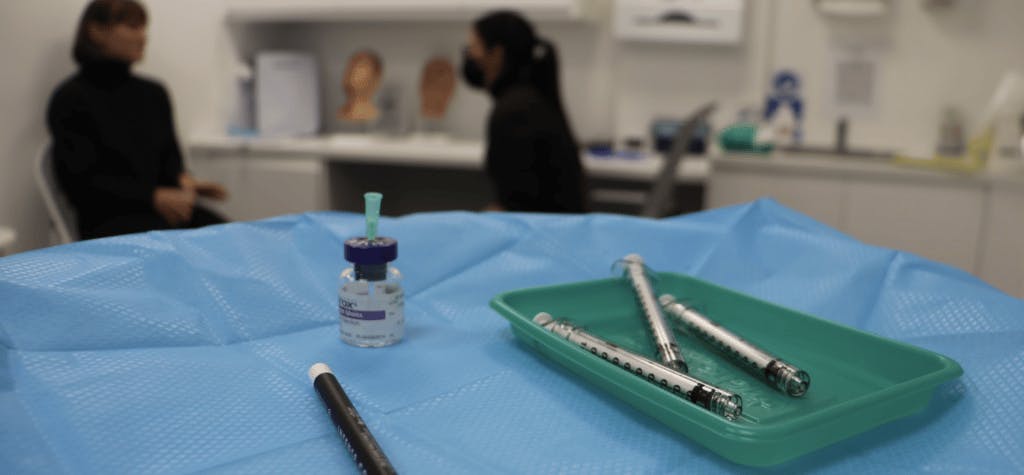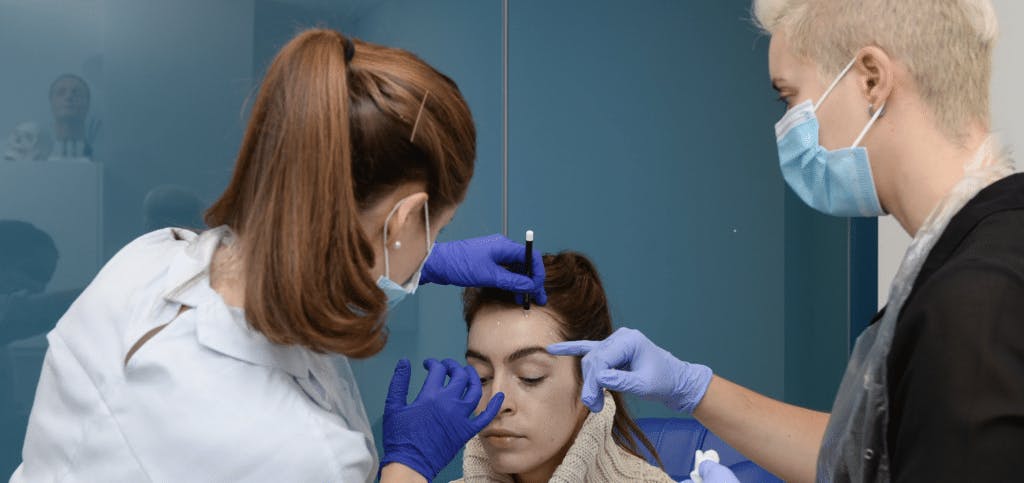Introduce UK Aesthetics Licensing “by July 2023”

The Health and Social Care Select Committee has published a report advising the UK government to “speed up” aesthetics licensing.
It lists a number of recommendations which MPs believe need to be implemented swiftly for reasons of patient safety.
Top of this list is the introduction of a licensing system to regulate aesthetics in England. This would involve setting a minimum standard of education for practitioners in order for them to be eligible for the appropriate licence.
This is something we at Harley Academy have championed for many years and are pleased to see expedited in this way.
Whilst ironing out the details of this licensing initiative had been expected to take around two years, this report calls for implementation by July 2023.

Health and Social Care Select Committee Report on the Impact of Body Image on Mental and Physical Health
Officially titled the Health and Social Care Select Committee Report on the Impact of Body Image on Mental and Physical Health, this report was published online on 2 August 2022.
It contains the Health and Social Care Select Committee’s recommendations for regulating non surgical aesthetics procedures in the UK. These are based upon the insights and feedback the Committee has received from a wealth of individuals and organisations across the country.
The Joint Council of Cosmetic Practitioners (JCCP) is one of the bodies leading the way in discussions with the Committee. It has formed partnerships with various other stakeholders, including the MHRA and Chartered Institute of Environmental Health, for a coordinated approach to tackling the current lack of regulation.
Many of the report’s recommendations are based on those set out in the JCCP’s 10 Point Plan, released in March 2021.
You may have seen the media reacting to the news that dermal fillers may be made prescription only – as with Botox – as a result of this report. However, this is only part of the story.

Licensing aesthetics practitioners and their premises in England
Initially, the Government confirmed its intention to regulate non surgical aesthetics via the sector’s inclusion in the new Health & Care Act 2022.
Through this Act, the licensing of both aesthetics practitioners and their premises was made possible in March 2022. However, this has not yet been enforced.
This is because a consultation period during which the Government and its agencies would determine the best way to go about this, was required.
Additionally, criteria such as minimum education standards and any aesthetics qualifications practitioners must hold in order to obtain these licences, must be decided upon.
In the below video Dr Tristan Mehta, founder of Harley Academy and creator of the Ofqual-regulated Level 7 in injectables, explains what we knew about the plans prior to this report.
What recommendations does this report contain?
The key recommendations contained within this new report can be split into two categories relevant for injectors: Non-surgical cosmetic procedures and Body image.
Non-surgical cosmetic procedures recommendations include:
1 Calls to introduce a new licensing regime by July 2023
2 Making dermal fillers prescription-only
3 Introducing minimum standards of education and injectables training for aesthetics practitioners
4 Establish a Non-Surgical Cosmetic Procedures safety taskforce that includes representatives from regulatory bodies. This would tackle issues such as remote prescribing, appropriateness of premises, education and training standards, accountability and governance, in a coordinated way.
5 Enforcing a two-part consultation process for aesthetics patients to allow for a 48 hour ‘cooling off’ period in between. This would mean having a consultation at least 48 hours before any treatment could be performed.
Body image-related recommendations include:
1 The aesthetics industry and Advertising Standards Authority (ASA) should work with advertisers and influencers to encourage them not to manipulate or alter images
2 Introduce a logo or motif that signifies that an image has been digitally altered. If commercial images used in the promotion of aesthetics treatments or products have been digitally manipulated, they should carry this logo
3 Make the diagnosis and treatment of Body Dysmorphic Disorder (BDD) a priority.

Aesthetics licensing and regulating cosmetic injectables
Jeremy Hunt, MP responds:
In a press release distributed by the JCCP, the Health and Social Care Committee Chair, the Rt Hon Jeremy Hunt said:
“The government must act urgently to end the situation where anyone can carry out non-surgical cosmetic procedures, regardless of training or qualifications. We heard of some distressing experiences – a conveyor belt approach with procedures carried out with no questions asked, procedures that have gone wrong, the use of filthy premises”.
“It was clear throughout our inquiry that some groups are particularly vulnerable to exploitation in this growing market that has gone largely unregulated. We need a timetable now for a licensing regime with patient safety at its centre to reduce those risks. We hope that ministers will listen to our recommendations and set about creating the safety standards that anyone seeking treatment has a right to expect.”
The JCCP responds:
Prof. David Sines CBE, the Chair of the JCCP said: “We are delighted that the key issues raised in our representation to the Select Committee have been supported by Jeremy Hunt and his colleagues. We very much look forward to continuing our engagement with the Government and health care regulators during the forthcoming months to realise the key objective of embedding patient safety and public protection for members of the public who elect to engage with nonsurgical procedures within the context of national enforceable legislation’.
Dr Tristan Mehta responds:
Dr Tristan Mehta echoes these thoughts, saying “We welcome and fully support the Committee’s push towards licensing aesthetics practitioners sooner rather than later. However, it is vital that we get this right. Cosmetic injectables have been largely unregulated in the UK for so long, that this is our chance to make a huge impact.
“We believe these changes should start with establishing a minimum standard of education every non surgical aesthetics practitioner in the UK must attain in order to then be awarded the necessary licence to practice. It is also our belief that these should be tied to the HEE guidelines, which formed the basis of our Level 7 Diploma in Injectables and Fast Track Level 7.”
He adds, “Whilst the question of ‘who should practice injectables in the UK?’ remains unanswered, for now, a competency requirement should at least be a positive step in improving patient safety. From there, we can continue to build an effective regulatory framework.”

Meeting the education standard for aesthetics licences
As we have said previously, until the details of the licensing regime are finalised, no one knows what educational standard will be required of injectors in order to obtain their aesthetics licence to practice.
However, as Dr Tristan says, we believe it is likely that the appropriate qualification will follow the HEE guidelines, which is mapped to our current Level 7 Diploma.
Since then, our Level 7 Diploma in Botox & Dermal Fillers has only been improved. Therefore, we believe this qualification – whether in its full format or as the expedited Fast Track Level 7 Diploma form – will stand anyone preparing to meet these new licensing criteria in good stead. These in-depth expert-led injectables courses can be completed in 6-36 months (usually 6-18 months), or 6-12 months, respectively.
We are also now offering a non-qualification route which allows experienced aesthetics practitioners the opportunity to join the JCCP register following the successful completion of a two-part exam. This is known as the JCCP Fast Track Assessment.
You can find out more about all our injectables courses via our website, or by booking a call with our courses advisor, Christine Slater. Christine will be able to discuss your requirements and set you on the best path towards aesthetic excellence, working to a budget and timetable that suits you.
We will bring you further information on these new aesthetics regulations as it becomes available.
All information correct at the time of publication
Download our full prospectus
Browse all our injectables, dermal fillers and cosmetic dermatology courses in one document
By submitting this form, you agree to receive marketing about our products, events, promotions and exclusive content. Consent is not a condition of purchase, and no purchase is necessary. Message frequency varies. View our Privacy Policy and Terms & Conditions
Attend our FREE open evening
If you're not sure which course is right for you, let us help
Join us online or in-person at our free open evening to learn more
Our Partners













STAY INFORMED
Sign up to receive industry news, careers advice, special offers and information on Harley Academy courses and services

